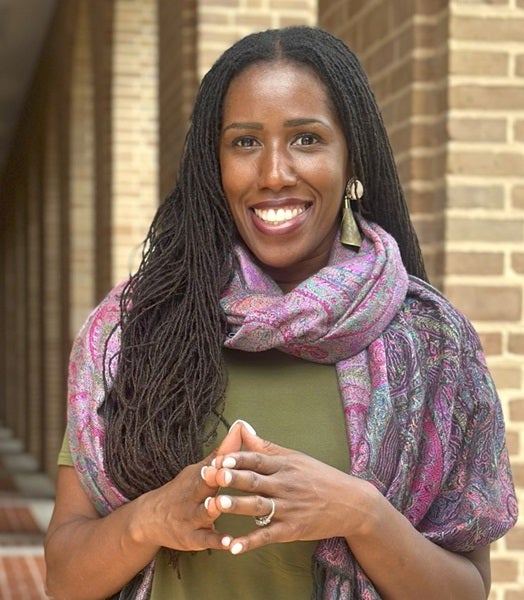Elizabeth Hordge-Freeman is an Associate Professor of Sociology at Rice University whose scholarship advances an intersectional analysis of race, gender, family, and the African Diaspora. Her work examines how race and gender operate as mutually constitutive systems of power, with particular attention to the emotional regimes that sustain racialized and gendered hierarchies. Drawing on more than a decade of ethnographic research in Brazil, her award-winning scholarship highlights the central role of emotion in systems of power and oppression. More broadly, she explores how global anti-Blackness shapes the structural and affective experiences of Afro-Latin Americans, Afro-Latinxs, and African Americans, especially Black women and families in the work and educational context.
She is currently completing a book, Feeling Under Threat, which develops a broader framework for understanding how emotional dynamics (both intimate and institutional) are integral to structures of power, control, and domination. Extending this work, Dr. Hordge-Freeman leads a community-engaged research initiative on racism and racial bullying in schools. The project investigates how racialized disciplinary practices, peer harassment, and institutional responses affect students’ emotional well-being, academic engagement, and family life. In partnership with educators and community organizations, the initiative documents patterns that often go unrecorded, centers the voices of families, and offers research-based strategies for building more equitable school environments.
At Rice, she holds a joint appointment in the Center for African and African American Studies (CAAAS), reflecting her interdisciplinary commitments. In 2023, she launched the Imagine Blackness AI project and exhibition with her husband, artist McArthur Freeman, exploring Black identity, speculative fiction, and technology. In 2024, she co-directed the award-winning documentary Journey Towards Justice, which chronicles students’ emotional journeys along the Civil Rights Trail in Alabama. She launched the inaugural Journey Towards Justice course at Rice in Spring 2025 and plans to expand the program to Salvador, Bahia, Brazil. In Fall 2026, she and her husband will begin serving as Magisters of Wiess College.
PUBLICATIONS
Books:
Hordge-Freeman, Elizabeth. 2022. Second Class Daughters: Black Brazilian Women and Informal Adoption as Modern Slavery. Cambridge: Cambridge University Press.
- Winner of the 2024 American Sociological Association, Section on Sociology of Human Rights, Gordon Hirabayashi Human Rights Book Award
- Winner of the 2024 American Sociological Association, Section on the Sociology of Emotions Outstanding Publication
- Co-Winner of the 2024 Brazilian Studies Association, Roberto Reis Book Prize (senior scholar category)
- Co-Winner of the 2023 American Sociological Association, Section on Race, Gender, and Class Distinguished Scholarship
Hordge-Freeman, Elizabeth. 2015. The Color of Love: Racial Features, Stigma, and Socialization in Black Brazilian Families. Austin: The University of Texas.
- Winner of the 2018 American Sociological Association, Section on the Body & Embodiment, Best Publication Award
- Co-Winner of the 2017 Society for the Study of Symbolic Interaction, Charles Horton Cooley Book Award
- Winner of the 2016 American Sociological Association, Section on Emotions Recent Book Contribution Award
- Selected as Honorable Mention, Harlem Book Fair/Phyllis Wheatley First Non-Fiction Book Award
Co-edited books:
Noles Cotito, Mariela and Hordge-Freeman, Elizabeth (eds.) 2024. Ciudadanías invisibles: Miradas en torno a la afroperuanidad y la negritud. Lima: Fondo Editorial de la Universidad del Pacífico.
Mitchell-Walthour, Gladys and Elizabeth Hordge-Freeman. eds. 2016. Race and the Politics of Knowledge Production: Diaspora and Black Transnational Scholarship in the USA and Brazil. NY: Palgrave Macmillan.
Select Publications:
Hordge-Freeman, E., & Loblack, A. 2026. "The power of affective capital: rethinking emotions in racial domination." Ethnic and Racial Studies, 49(2), 405–420. https://doi.org/10.1080/01419870.2025.2570477
Hordge-Freeman, Elizabeth. 2024. "Disruptive Silences: Affect and Embodied Experiences of Systemic Oppression." pp. 144-155. Moving from the Margins: Life Histories on Transforming the Study of Racism. eds. Margaret Andersen and Maxine Baca Zinn, CA: Stanford University Press.
Abella, A.L.D., Hordge-Freeman, E., Conner, K., Armstrong, L., Wilson, R. and Landers, M., 2024. "Parent and Staff Insights to Understanding Challenges with Engaging Black Families in Early Childhood Programs." Journal of Child and Family Studies, pp.1-18.
Hordge-Freeman, Elizabeth and Angelica LoBlack. 2021. “Cops only see the brown skin, they could care less where it originated: Afro-Latinx Perceptions of the #BlackLivesMatter Movement." Sociological Perspectives. https://doi.org/10.1177/0731121420961135
Hordge-Freeman, Elizabeth and Edlin Veras. 2020. “Out of the Shadows, Into the Dark: Ethnoracial Dissonance and Identity Formation in Afro-Latinx Families.” Sociology of Race & Ethnicity. https://doi.org/10.1177/2332649219829784
Hordge-Freeman, Elizabeth. 2018. "Bringing your Whole Self to Research: The Power of the Researcher’s Body, Emotions, and Identities in Ethnography." International Journal of Qualitative Methods, Volume 19, pp. 1-9. https://doi.org/10.1177/1609406918808862

